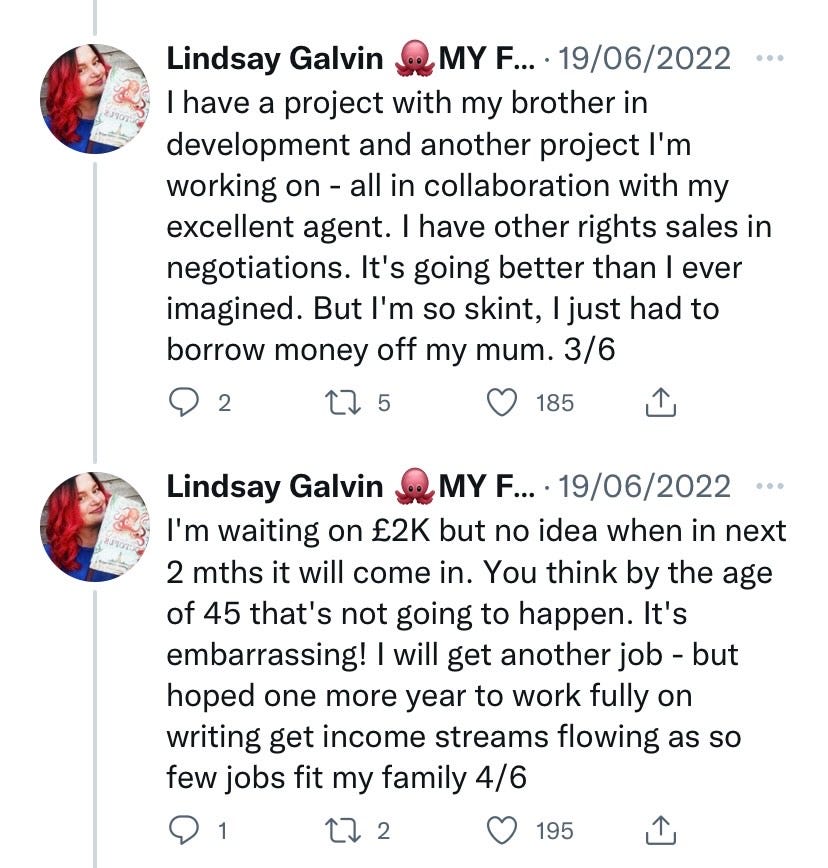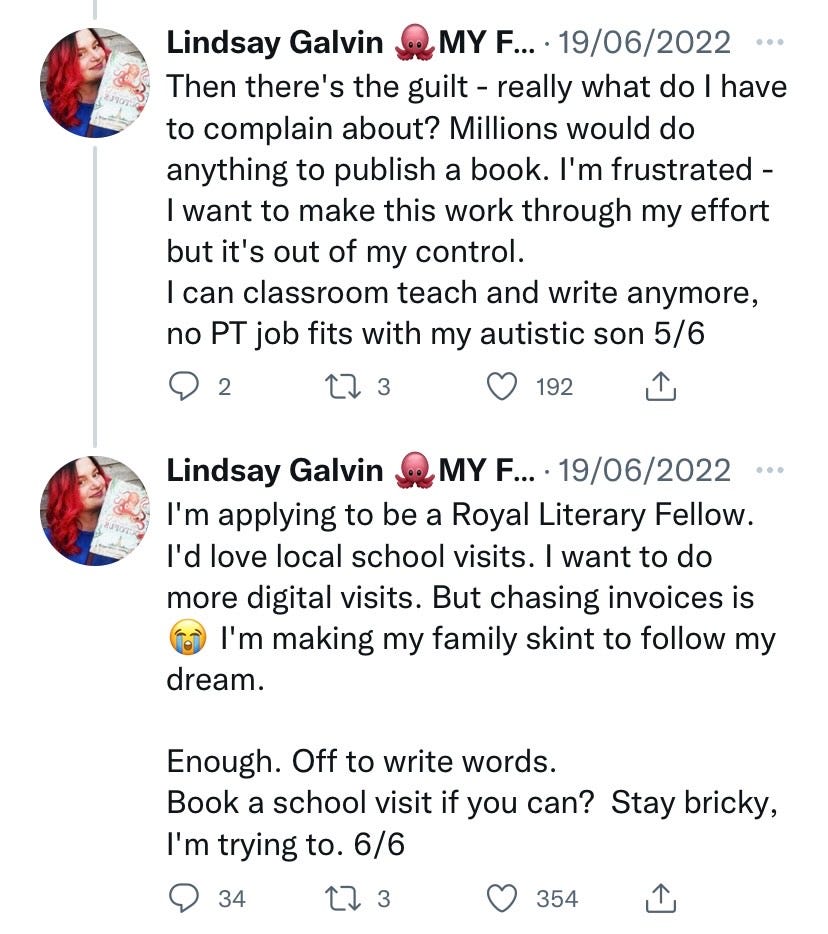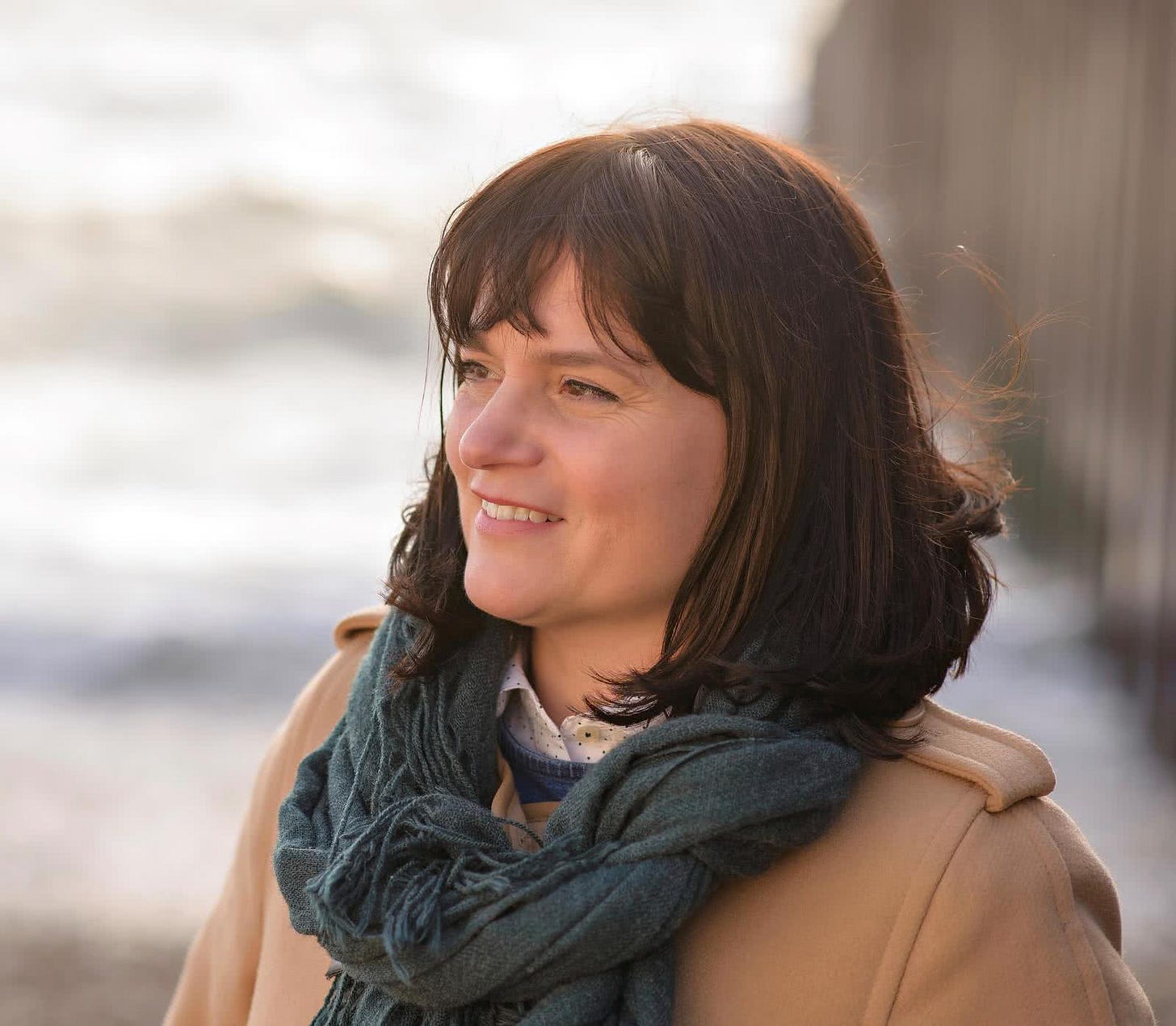It’s Monday, the sun is shining, and I just forced myself to sit down and do an Income & Expenditure spreadsheet.
It told me that my monthly outgoings are around £700 more than the money coming in. I knew I had more going out than coming in because the house money is… what’s a stronger word than dwindling? But I didn’t know exactly how much. And now I do know how much I feel better. Because it gives me something to work with.
I spent last week fretting but being too scared to check. That never works for me.
(One thing I do notice that makes a difference is hormones - week before my period, money stuff feels impossible, overwhelming, frightening. Week of my period? Manageable.) (And the week after my period is pretty much the only time I feel super motivated, so I need to remember to try to fit a full month’s work in there.)
Anyway. Short one from me this week because I want to tell you what’s coming up in the next few weeks and then skip straight to the interview.
Last month, author Lindsay Galvin tweeted the following:
The thread seemed to resonate with pretty much every author I follow, so obviously I asked Lindsay if I could interview her for this newsletter (see below!).
But I also decided to do an author series. Starting today.
I think I’ll be posting twice a week (the Monday post will include me, as usual; the second post will just be the interview) so it doesn’t actually run for too long, but obviously author income is an important issue for me and something that’s still not talked about enough within publishing. (And yet it’s pretty much the first thing authors talk about whenever we get together.) (Once we’ve slagged off that one guy.)
Paid subscriptions enable me to keep writing these newsletter. If you’re not a paid subscriber already, I’d love it if you’d consider upgrading. (And if you are, thank you, I love you.)
If you would like a paid sub, but can’t afford it right now, email me and I’ll sort it.
An interview with Lindsay Galvin, 45, Author
I wasn’t fearful of doing myself real damage as other authors were implying they would be.
What made you tweet about money that day? Were you nervous to talk about it? What was the response like?
I was nervous to talk about it, but I was also just incredibly fed up as I was waiting on late payments for events, plus a project was in long contract negotiations, I had a failed grant application that I’d been really hoping to get, and I simply hadn’t planned for the unreliability of my earnings. So I had to borrow money from my mum!
I was annoyed at myself, and also because I am actually sort of further on than I imagined in my writing career with my last book doing so well, but was still skinter (a word?) than I’d been in years. I started the tweet — ‘A thread I will delete’ as I just wanted a quick rant but had such an overwhelmingly positive supportive responsive mainly from other authors but also from bookish people everywhere - there was no way I could delete!
I also had a lot of private messages saying how brave I was, which is worrying. I have a very honest and frank relationship with both my agent and publisher so although I was a little worried that my tone could be misinterpreted and checked in with them, I wasn’t fearful of doing myself real damage as other authors were implying they would be.
How do you think publishers could help authors with the financial side of things? (Apart from paying us more!)
Well I really wish there was a radical overhaul of the entire publishing system. I think advances should be capped - so none of the huge millions especially for celebrities, as then there would be much more in the pot for everyone.
I also wish we could get paid monthly when we are contracted and working on a project, I don’t really understand why we wait until publication for the last third of our advance. Are there people who would keep the money and run? I find that hard to imagine with how rigorous contracts are.
I have to say that on an individual basis, I think my publisher is one of the best in terms of author care (and I know I would say that - but it is true) because they do pay decent advances, make a huge effort selling foreign rights - which boost author earnings a lot and are ongoing - and have paid me advance money early when I really needed it.
Why do you think women are often reluctant to talk about money?
That is a very good question. Maybe it’s considered impolite and I think society still puts greater pressure on women to be appropriate and well-mannered?
I think one of the main reasons I personally don’t talk about it is because I prefer to bury my head in the sand about not having as much of it as I’d like!
What is your relationship with money currently?
I’m very much in a transitional phase. I was made redundant from my part-time teaching job a year ago and want to give being a full time author a ‘go’. But after halving a salaried wage for 20 years the way we are paid as authors is a shock to the system when it’s all I have coming in.
In our household we need both wages. Partly this is mismanagement on our part as when we’ve received more than expected - my last royalty check was a nice surprise - we have spent more than we should (new patio).
I’ve never been a saver which frustrates me. We are currently dipping in and out of debt as I struggle to spread my earnings out over the year as the way we are paid is so uncertain and confusing.
I was planning to work for two years as a trial at being full time but am now investigating other streams of income - regular writing gigs and creative writing teaching. I’d love to just concentrate on writing my books but the money uncertainty does make it stressful.
What’s your earliest money memory?
We watched the pennies - but everyone seemed to in the 80’s - but we were always okay. We had birthday presents and a family holiday to Cornwall or Wales every year.
I never worried we wouldn’t be alright, until Thatcher and the interest rate soaring disaster just after my parents bought their first house when I was 11. Then I was genuinely fearful and my mum started childminding more than full time and my social worker dad worked a second job and took overtime.
The bad memories always stand out but generally we didn’t want for anything important, although we didn’t waste either.
What’s the biggest money mistake you’ve made?
I don’t like talking about mistakes or regrets I’m very much an (overly) optimistic look to future person. But I’ll indulge you!
My husband and I almost bought a flat as an investment just before we went to work in Thailand for two years 17 years ago. But the sale didn’t go through at the last minute. The trouble was that when we came home (and I was pregnant) the house prices had risen hugely but we never benefited from that, and the house we did buy quickly went into negative equity.
It meant we lived in that little two bedroom cottage for ten years rather than the five years we’d intended and still have a huge mortgage now. But — we were happy there and have a good house now so I always think what’s the point of the 'would’ve could’ve should’ve’.
What’s the best thing you’ve ever spent money on?
The dog! We bought a labrador pup 2 years ago and couldn’t really afford her at £1500 but my son is autistic so was important for us to get a pure bred puppy.
I am so rubbish at working out what money is coming in when... I actually received a payment from my German publisher that completely paid for her and I wasn’t expecting.
What would you do with £10,000?
Probably buy a better car — ours is geriatric and we’ll need one soon. But if it was a windfall we’d buy a family treat experience too, a little extra holiday away maybe or a festival.
Do you have a pension in place? If not, do you have a plan?
I have a teaching pension but was part time for 80% of my teaching career so I definitely need something else in place. My husband will have one of the better teaching pensions but I’d really like to save up enough to invest in property. But that’s a long way off!











